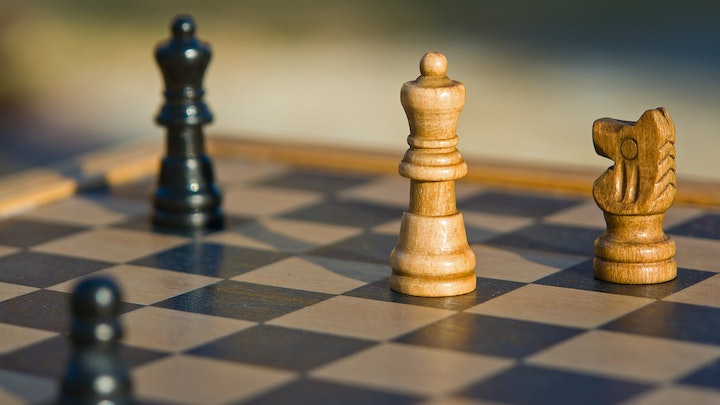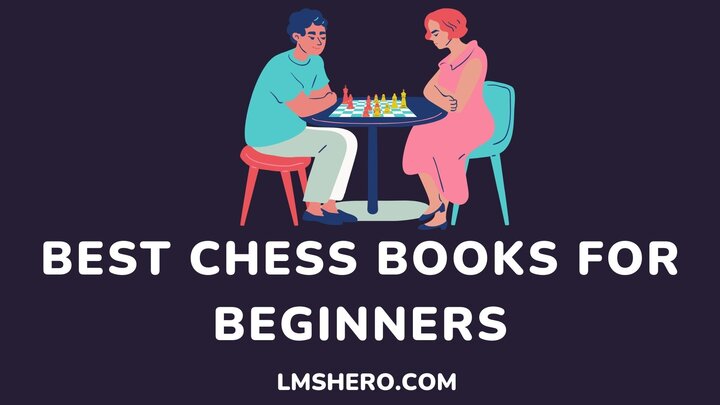To become a great chess player, you must understand the fundamentals of the game. For beginners, there is no better way to start than to get and study chess books.
Knowing which chess books to study can be tricky, but this guide will help you make an informed decision.
In addition, you will discover a concise buying guide for chess books and some important chess rules to master and become a pro.
1. Chess 101 by Dave Schloss
Chess 101 by David Schloss is designed to provide the basic information you need to play chess. The book breaks down chess by explaining:
- How to set up different chess boards
- The various pieces in chess and how they move
- How to write chess notations and other fundamental etiquettes.
Each chapter in this book is simple and well-organized. In addition, it also provides information on how to get started in a chess competition.
Pros
- Suitable for all skill levels
- A very handy material
- Follows a step-by-step learning approach
Cons
- Not enough practice questions
- Must be combined with other resources for beginners
2. Bobby Fischer Teaches Chess by Bobby Fischer and Stuart Margulies
This is another best-selling chess book. Bobby Fischer Teaches Chess centers on the different tactics involved in Chess.
The book contains programmed instructions to keep students on their toes until they fully understand chess.
Co-authored by Stuart Marguile, Bobby Fischer Teaches Chess readily comes with practice questions and answers. Get this book if you are interested in simple and innovative materials to learn chess.
Pros
- Simple and effective teaching method
- Great for all skill levels
- It comes with practice questions and answers
Cons
- Printing can be better
3. Winning Chess Strategies for Kids by Jeff Coakley
Winning Chess Strategies offers the most simplified method of learning chess. Although it is best for kids between 7 and 13, adults without knowledge of the game can also start with it.
Jeff Coakley’s book features:
- The rules of chess, opening principles, and piece transition
- Tactical combinations and strategizing
- Endgame techniques
As a parent, this is a book you should get for your kids if you want them to become great at chess. It can also guide you if you wish to learn chess during leisure hours.
Pros
- Well alphabetized, just like a dictionary
- You learn as you go
- Best for beginners only
Cons
- Not so portable
- Fonts can be bigger
4. Beginning Chess by Bruce Pandolfini
Bruce Pandolfini is renowned for producing chess guides for beginners and intermediate players.
Beginning Chess is a breakdown of the rules of chess and piece identification. It then proceeds to provide beginners with over 300 practical chess questions.
Answers to the questions are graded using a scoring system only available in the book. This method makes it easy for you to learn and monitor your development.
Beginning Chess is also a perfect resource for busy beginners. This is because it allows you to pick and solve problems without spending much time.
Pros
- Suitable for only beginners and intermediate players
- Focuses on improving your game
- It comes with a grading system
Cons
- It may require additional resources
- Printing can be improved
5. The Steps Method by Rob Brunia and Cor Van Wijgerden
The Steps Method is a full beginner’s guide containing about six training manuals and twenty workbooks. It is one of the most popular chess textbooks in the world, so much so that all its courses have an English version.
The Steps Method primarily follows a step-by-step approach in teaching chess. It strictly forbids skipping a tutorial and can build your confidence in no time.
Pros
- Purely foundational
- It contains the history of chess and illustrations
- Learn-as-you-go approach
Cons
- Not handy
- A bit pricey
Buying Guide: What to Look For in a Chess Book

Perhaps you want to do your research before deciding on any book. These are the criteria to watch out for:
1. Synopsis
A synopsis summarizes everything you need to expect from a book. Reading them will tell you if your choice of chess material is purely foundational or great for all skill levels.
2. Reviews
Reviews are another way to know if a book is best for you as a beginner. You can surf the internet or ask people verbatim what they think about a book.
3. Recommendations
Chess books come with recommendations from authors. Some books are suitable for all skill levels, while others can be specific. Without studying the recommendation section, you cannot know this.
What are the 7 Important Rules in Chess?
The 7 major rules in chess are:
- Touch move
- The 50-move rule
- The new 75-move rule
- Three-fold repetition
- En Passant
- Castling
- Pawn promotion
Perhaps, as a beginner, you would prefer to start with a free guide. The Chesskid Curriculum is a resource I always recommend. It contains diagrams, worksheets, and games that will walk you through chess concepts.
FAQs
Is chess good for your brain?
Yes, chess is good for the brain. The game forces the brain to think, recognize patterns, and make logical decisions.
How hard is chess to master?
Chess is very easy to understand. It would help if you had an in-depth understanding of the basics, piece movements, and special rules.
What is the 20-40 40 rule in chess?
The 20/40/40 rule simply implies spending 20% of your time on openings, 40% on the middle name, and 40% on the endgame. The rule is mostly used for players rated under 2000.
Can chess be self-taught?
Chess can be self-taught. There are a lot of resources out there that make this practice very achievable.
Conclusion
To gradually unlock your chess skills, you need a beginner guide. Now that you have a list of proven books you can start with, you must be devoted to studying and increasing your IQ.
I hope you found this article helpful. If you want to learn about some interesting ways to increase your IQ, see the practices that can help.
Thank you for reading.






